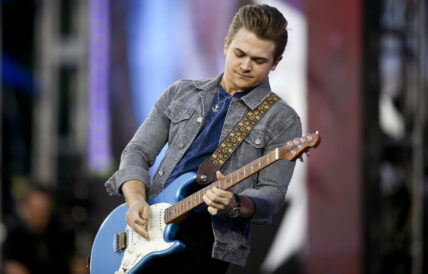“Green” fashion moves past hemp
Although I’m an avid recycler, my thoughts about eco-friendly fashion largely have been timetrapped in all that was 1998, centering on the unflattering, hemp-made sack dresses, T-shirts and pants.
My ‘aha’ moment came earlier this year. While watching “The Janice Dickinson Modeling Agency” on Oxygen (Come on, you know you watch it, too!), I learned that 2(x)ist Underwear soon would sell men’s undies made from soy.
Soy, the same basic ingredient for miso soup and tofu burgersfi Could that be for realfi Yes, and I’m sure you already know this.
The “green” movement, which has been working its way into fashion for a few years, has pushed ahead with a variety of sustainable and organic fabrics such as bamboo, seaweed and corn. All these fabrics will be found in some form in select cities in the months ahead; and of course, you can find organic apparel at stores such as Whole Foods.
To dive into all things green, I caught up with Jyl Kutsche, a former designer and merchandiser who owns Therapy in Austin, Texas. She doesn’t just talk green, she lives it.
Her 11-year-old boutique, which features chocolates and a wide variety of women’s and men’s apparel, is a testament to being environmentally responsible. Years ago, Therapy was nestled near Eco-Wise, an earth-friendly retailer that helped bring the green movement to Austin. The store’s Web site, www.therapyclothing.com, makes the overall mission clear: “Dress well. Eat chocolate. Live green.”
“When I was doing designing, I was always trying to use whatever organic or sustainable fabrics that I could find,” Kutsche said days after she had returned from Los Angeles Fashion Week events, where she checked out the goods from new and upcoming eco-friendly designers. “But that was awhile ago, and there wasn’t as much. You had to have silks, and everything didn’t have the soft fluidity to it. Until recently. Three or four years is when the shift started happening. It’s making me happy to do fashion again.”
Not only does Kutsche sell organic clothes, she has customers toting canvas shopping bags out of her store, and she encourages shoppers to skip bags with their purchase by offering a gift certificate drawing. She also selects pieces that are made with fair labor practices.
But it’s what Kutsche has planned for next fashion season that is a real testament to a green attitude. As part of a campaign – she calls it “Eco With An Edge” – Kutsche has pledged that by next spring, her boutique will sell a majority of goods made from sustainable and organic fabrics.
Over the years, she has stocked goods from organic brands such as Loomstate, Ecoganik and Stewart Brown. Next year, the store’s men’s selections will be 100 percent green, and the women’s will reach 80 percent, she said.
“There are a few guilty pleasures you’ve got to throw in there,” she said. “Lines I just love, love, love. I feel they are sustainable in a whole different way, and that they are such beautiful items you end up having them for years and years as opposed to super-trendy clothing.”
For years, I have been fooled by the notion that organic fabric couldn’t be turned into a stylish dress or shirt. I now stand corrected after scanning the racks at Therapy and its online store.
Here are several selections that caught my eye: Young, Fabulous & Broke offers a tuxedo dress made from 100 percent modal fabric with washed silk pleating detail on the front; the American Caveman bamboo T-shirt; the exclusive Loomstate “Extinction Is Forever” Tshirt created for the recent Austin City Limits Festival; Loomstate’s organic cotton denim; Edun’s To The Stars men’s Tshirt from 100 percent organic cotton; and the Melissa Ultragirl wedges – even the “velvet” flocking – which are made from partially post-consumer recycled plastic.
Another eco-friendly line for Therapy that grabbed my attention will arrive later this month. It’s the line of solarpowered handbags from Noon Solar, a company started by two Art Institute of Chicago students. The panel is supposed to provide enough juice to charge cell phones, iPods and PDAs, and the bags are made from biodegradable materials such as chrome-free leather.
“Now there are so many amazing lines out there,” Kutsche said. “They have these great stories, and they are using these cutting-edge fabrics, stuff made out of seaweed or soybeans or corn.
“It’s crazy. It’s fun. I love fabric. I love fashion, but I love fabric more,” she said. “You’re getting cool fashion pieces. I don’t want to be pounding it into heads because it’s still fun, and it’s still fashion.”



